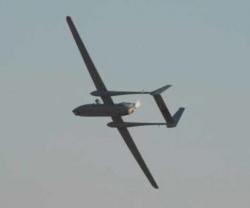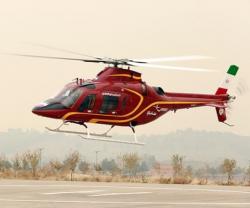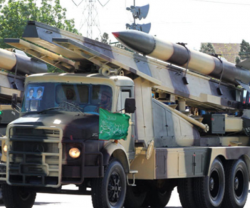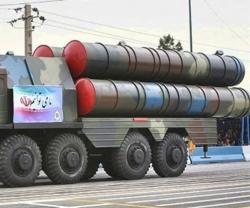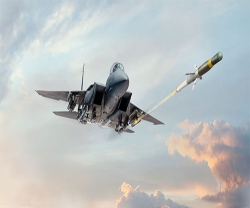In a straight fight between Israel and the Palestinians in the Gaza Strip there is no question who has the upper hand. Israel's Armed Forces are among the world's most sophisticated.
Their ability to mount a drone strike of the kind that killed the Hamas military leader Ahmed Jaabari on Wednesday attests to a deadly combination of precise weaponry and accurate intelligence.
But in the latest round of the conflict the Palestinians have used a weapon which gives them a rare if short-lived advantage – a rocket which can strike at Israel's civilian heartland. This is the Fajr-5, developed by Iran and also supplied to Hezbollah, Tehran's Lebanese ally. It has a range of up to 46.6 miles (75km), which means it can hit Tel Aviv and elsewhere in the heavily populated conurbation in central Israel.
Ehud Barak, the Israeli Defence Minister, announced on Wednesday that Israel had destroyed most of these missiles in air attacks during the first hour of its continuing offensive. But Islamic Jihad, another militant Palestinian faction, said on Thursday that it had launched a Fajr-5 at Tel Aviv, triggering the city's first air raid alert since it was hit by Iraqi Scuds during the 1991 Gulf war. Barak went on TV to warn that Gaza would pay “a heavy price for this escalation”.
The missile is not a game-changer, but it does even out the stakes.
Moshe Yaalon, Israel's Deputy Prime Minister, signaled on Friday that the Palestinian arsenal was now more or less depleted. “I don't know if they still have one or two missiles left,” he said. “But they don't have a stockpile that can threaten central Israel.”
Firing those that remained, suggested the global intelligence analyst Stratfor, was a “use it or lose it” strategy.
The Fajr (“Dawn” in Arabic) is in a different league from shorter-range rockets like the homemade Qassam – built in workshops in Gaza – with ranges of up to a dozen or so kilometres. Qassam variants have repeatedly hit towns in southern Israel since 2005.
Missiles that hit Tel Aviv and Jerusalem on Friday were described as Qassam M75s. Grad missiles, also thought to have been supplied by Iran, have a range of up to about 20km.
It was striking that Hassan Nasrallah, Hezbollah's leader, singled out the Iranian-made weapon in a speech in Beirut on Thursday. “The firing of Fajr-5 rockets on Tel Aviv shows the maturation, the wisdom and strength, and the courage of the Palestinian resistance in the Gaza Strip,” he said. “The Israeli enemy was surprised and forced to acknowledge that its capital had been hit.”
Exactly how the Fajr-5 reached Gaza is not known. But its parts were probably smuggled in through the tunnels that link the blockaded enclave to the outside world. In October 2011 international observers in Sinai reported that one had been test-fired in the desert.
Israel has devoted considerable diplomatic, military and intelligence resources to halting the flow of weapons of all kinds into Gaza, but especially those supplied by Iran. In January 2010, presumed agents from the Mossad murdered in Dubai Mohammed Mabhouh, the Hamas arms procurement liaison with Iran's Revolutionary Guards. The previous year Israel warplanes attacked a large convoy in Sudan. Only last month Israel in Khartoum, said to be owned by Iran. It all but admitted that it was responsible.
Israel has made no secret of its concern that weapons have also flowed from Libya, via Egypt and Sudan, into Gaza, since the overthrow of Muammar Gaddafi last year. These are mostly SA-7 anti-aircraft missiles and rocket-propelled grenades, less significant militarily than the Fajr-5.
In May the Head of Israel's Shin Bet security service, Yoram Cohen, called Libya “a new gate to hell”, because of the weapons reaching Hamas and other Palestinian groups in Gaza. Israel has tried in recent months to persuade Egypt, far less friendly since Mohammed Morsi's Muslim Brotherhood government replaced Hosni Mubarak, to choke off these supplies.
Meanwhile, a Senior Iranian Official has denied his country supplied the Fajr 5 missiles to Palestinian militants, Iran’s al-Alam television reported on Saturday.
“We deny having delivered the Fajr 5 to the Palestinian resistance. The aim of such accusations is to portray the resistance as weak whereas it is perfectly capable of producing the arms it needs,” said Allaeddine Boroujerdi, Head of Parliament’s Foreign Affairs Committee.
Source: The Guardian; AFP


